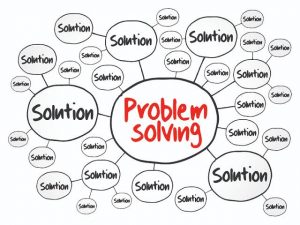When employers talk about problem-solving skills, they often mention the ability to handle difficult or unexpected situations in the workplace, as well as professional business challenges. Organizations rely on people who can assess both types of situations and calmly identify solutions. Problem-solving skills are traits that enable you to do this. While problem-solving skills are valued by employers, they are also highly useful in other areas of life such as relationship building and day-to-day decisions.

Understanding the key components involved in problem-solving will help you to enhance this skill set and exemplify your expertise to employers. Strong problem solver is a valuable addition to any team.
You can use many different methods for problem-solving, but you will usually work through four different steps, no matter which path you take. Understanding each step of the process will help you improve your problem skills so that you can be better served along your journey toward a smart, practical solution.
Problem-solving may seem straightforward at first glance, but there are many employees who stumble across one or more key stages when they fail to successfully resolve workplace issues. Successful problem-solving requires many important skills that will help you move efficiently from identification to implementation.
In the early stages of problem-solving, you must have strong observation skills. Instead of accepting issues at face value, you need to demonstrate lateral thinking and analytical abilities. These will help you to properly assess what is happening and indicate the root cause of the problem.
When you explore possible solutions to the problem, you must demonstrate persistence. Finding the right approach to the problem will not come easily. Innovative thinking will serve you well. Employees who know how to use their creative thinking features will excel in the second and third stages of problem-solving, as they are able to come up with approaches that others have overlooked.
Implementing your solution requires your own skill set. This usually requires a careful balance of teamwork and leadership. You will need to show flexibility to withstand the inevitable pushback from colleagues who resist change. At this point both communication and interaction are important. Once you implement your solution, you will need to use critical thinking and attention to assess the outcome as you bend your strategy to solve the problem successfully and change your strategy as needed Huh.
Suggested article: Do these 5 tasks every day, soon you will also start talking in English
Problem-solving skills are important in every industry. There is no business that is immune to the regular onslaught of problems. Business managers and office managers can find almost every aspect of their daily routine centers around some type of problem-solving. When you are in a management position, one of the most important tasks you do is handling the issues of the day ahead for your employees.
Improving your problem solving skills will give you a distinct edge over a management job and other positions within your company. You can enhance your problem solving skills:
Just stating “problem-solving skills” on your resume is not enough. You really need to explain what kind of problem-skills are you excel at and show specific examples of how you have used these skills in previous positions.
When you are demonstrating your problem-solving skills on a resume, you should pay close attention to how you identified the problem, developed a solution, and implemented this strategy.
Some examples of strong problem-solving include:
Make it clear that you saw a problem relevant to your department, find an innovative way to solve it and achieve measurable results with your chosen strategy. Problem-solving performance is important for which position you are applying for. In customer service, you solve the problem every time to deal with a difficult customer. As an accountant, you are problem-solving ways to cut costs and increase revenue. Contractors resolve issues that seem inaccessible to a construction location given to a client’s requests. You are always problem-solving. Make sure that potential employers can see that you are good at it.
Problem solving skills are as diverse as those applied to issues. However, all use the same basic approach to identify the best problem solvers and solve problems, including the skills described here to take advantage of successful results. Make sure you track your problem-solving successes, measure results, and include them in your resume, so hiring managers will have no trouble identifying you as a strong problem solver.
Kindly visit http://english-pro.in/ website. English pro offer English speaking course in Chandigarh institute at sector 34A. Learn english course to enhance your critical thinking and problem solving skills.
Related post: 6 unusual ways to improve your self-confidence in speaking English
*
Be the first to comment.